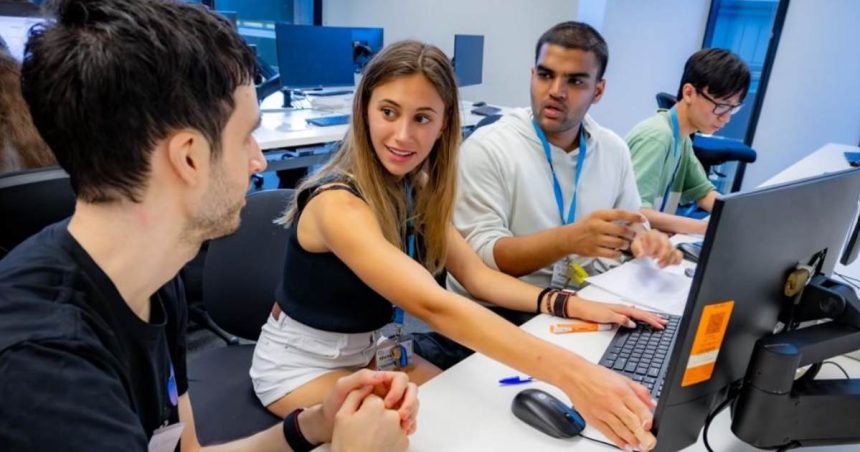To mark International Girls in ICT Day on Thursday 25 April, EducationDaily talked with 16-year-old Year 11 Marist Catholic College student Michaela Loukas about her love of STEM and her determination to dispel gender stereotypes in the world of information and communications technology.
The stories behind ‘Girls in ICT Day’ are critical to keep telling in Australia – especially given only 15 per cent of STEM-qualified jobs are held by women. According to a 2023 state of STEM equity report published by the Department of Industry, Science and Resources, girls only make up about a quarter of enrolments in Year 12 information technology, physics and engineering classes.
After winning the NSW Best Coder award at just 10 years old, Michaela – a self-professed “well-balanced nerd” – won the highest Academic Award in her year group every year from Years one to 10, and most recently completed Grok Academy’s National Computer Science School summer program.
She’s passionate about digital technology skills being the “make or break” of future employability, regardless of gender or background.
“I was born in Greece and moved to Australia shortly before my 5th birthday. I didn’t speak English in the early days and went straight to primary school. The transition was difficult,” Michaela told EducationDaily.
Despite her “very limited” English language knowledge, Michaela won ‘most improved student’ before going on to win “the highest academic award in my year group every year (Years one to 10) after that”.
“I’m a fast learner and I’m disciplined,” she says.
She’s since heard from mentors that being bi-lingual helps with programming and believes having good linguistic skills are just as important as technical skills.
“Coding is just another language,” she says.
Coding and creativity
Having participated in coding camps and displaying a passion for problem-solving, Michaela says her enthusiasm for ICT was strengthened and supported by a new principal who brought her own background in STEM to the school.
“She was driven to make STEM a core part of education,” adding that getting young students interested in STEM is “all about exposure”.
Although she had previous programming experience, Michaela says learning about Grok Academy – a not-for-profit coding education site – nurtured her interest.
“Following Year eight, I’ve used Grok many times in my IST course from Year nine to 10 and have become quite familiar with the platform. A lot of my projects, such as a Python loan calculator and MicroBit ‘smartwatch’, have been created using Grok as a platform,” she says.
She pushes back against the idea that girls are ‘not meant to’ love STEM.
“I’ve always looked beyond the stereotype. We need to eliminate those stereotypes and it’s unfortunate that they persist today,” she told EducationDaily.
“They’re really prominent in co-ed schools, where there are negative stereotypes about tech students. I try not to consider the stereotypes and look beyond them. I feel that since I don’t conform to those stereotypes other girls thought I was interested in tech to ‘impress boys’!”
Overcoming peer group pressure
She says the issue is especially challenging in high school, “where social dynamics are strong and teens fear being excluded”.
“Categories help them feel like they belong somewhere,” Michaela says.
“Sadly, this categorisation is based on superficial qualities – probably because it’s the fastest and easiest way to label people. I see it at my school. Students are grouped into the ‘the popular kids’, ‘the sporty kids’, ‘the dance girls’, ‘the nerds’, ‘the gamers’, or ‘the weird kids’. Sometimes it’s like a Venn diagram, and you can fit into multiple categories, but the first label you’re given tends to stay with you for all of high school.”
She remembers being asked by a female school peer about who her friends were and “when I told her, she said “oh you mean the nerds’ – and she never spoke to me since”.
“I guess my assigned category ranks low on the high school social hierarchy. That’s ok. Nerds are cool.”
Apart from tech, she says “I’ve always been interested in writing”.
“I have always had a mix of humanities and English. These subjects entwine with STEM as I see coding as a creative process,” Michaela told EducationDaily.
STEM is the “way of the future”
To encourage more parents to support their child’s love interest in STEM, Michaela says she wishes more people realised “STEM, and specifically coding, is the way of future”.
“It will revolutionise every field – medicine, law, architecture, business. A lot of the fear around STEM coding and computer science in general that it will make everyone redundant or that AI will replace human skills and anyone who studies it at university will be without a job. I don’t subscribe to that at all. You will still need human intervention. It not only underscores every industry, but it will enhance every field and will make or break the employability of people in the future.”
According to the Tech Council of Australia, Australia will need to employ an additional 653,000 tech workers by the end of the decade, but we only have around 7000 students graduating each year with IT degrees.
To address the issues, Michaela says schools need to work harder to make STEM education more relatable – and especially for female students.
“It definitely relates to early exposure and more female role models,” she says.
“I participated in coding camps during school holidays in early primary school, but it only stuck when I had a relatable female teacher to encourage me in my late primary years. Tearing down that stereotype is also important. There are more prominent stereotypes in co-ed schools. So many girls are susceptible to stereotypes. We pick our electives in Year eight and studies show this is the time when a girl’s self-esteem is at her lowest, leading them to pick subjects their friends choose and not what really interests them for fear of being judged, mocked or left out. That’s why interest has to be nurtured at a much younger age.”
Fostering a lifelong love of learning
Having spent time in July 2023 as part of a work experience run by Sydney University’s School of Chemical and Biomolecular Engineering, Michaela told EducationDaily that her desire to continue with tertiary studies was cemented.
“I just loved the atmosphere of academic exploration and collaboration and the freedom in learning. Pursuing these kind of extracurricular enrichment opportunities is so helpful.,” she says.
“So, while I definitely know that I want to go to university, I keep oscillating between degrees and career paths. The two I come back to are computer science and medicine. Ideally, I’d combine both. My dream is to help make some kind of advancement in health through technology. My dad jokes that he wants to be first in line for anything I create, due to his multiple health issues.”
For now, she says she’s just focusing on “doing the best I can in all the subjects I’ve chosen”.
“They’re a mix of humanities and STEM because I like both. I also want to enjoy my teenage years and leave time for the social side of high school.”







